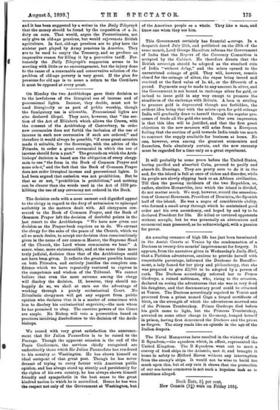On Monday the two Archbishops gave their decision as to
the lawfulness of the liturgical use of incense and of processional lights. Incense, they decide, must not be used liturgically or as part of public worship, though the fumigatory use is allowable. Processional lights are also declared illegal. They note, however, that " the sec- tion of the Act of Eliiabeth which allows the Crowni with the consent of the Archbishop of Canterbury, to order new ceremonies does not forbid the inclusion of the use of incense in such new ceremonies if such are ordered," and therefore it would always be possible, "if some great occasion made it suitable, for the Sovereign, with the advice of the Primate, to order a great ceremonial in which the use of incense should form a part." The grounds on which the Arch- bishops' decision is based are the obligation of every clergy- ingn to use "the form in the Book of Common Prayer and none other," and the fact that the Book of Common Prayer does not order liturgical incense and processional lights. it had been argued that omission was not prohibition. But be that so or not, "prohibitibn is prohibition," and nothing can be clearer than the words used in the Act of 1559 pro- hibiting the use of any ceremony not ordered in the Book.


































 Previous page
Previous page